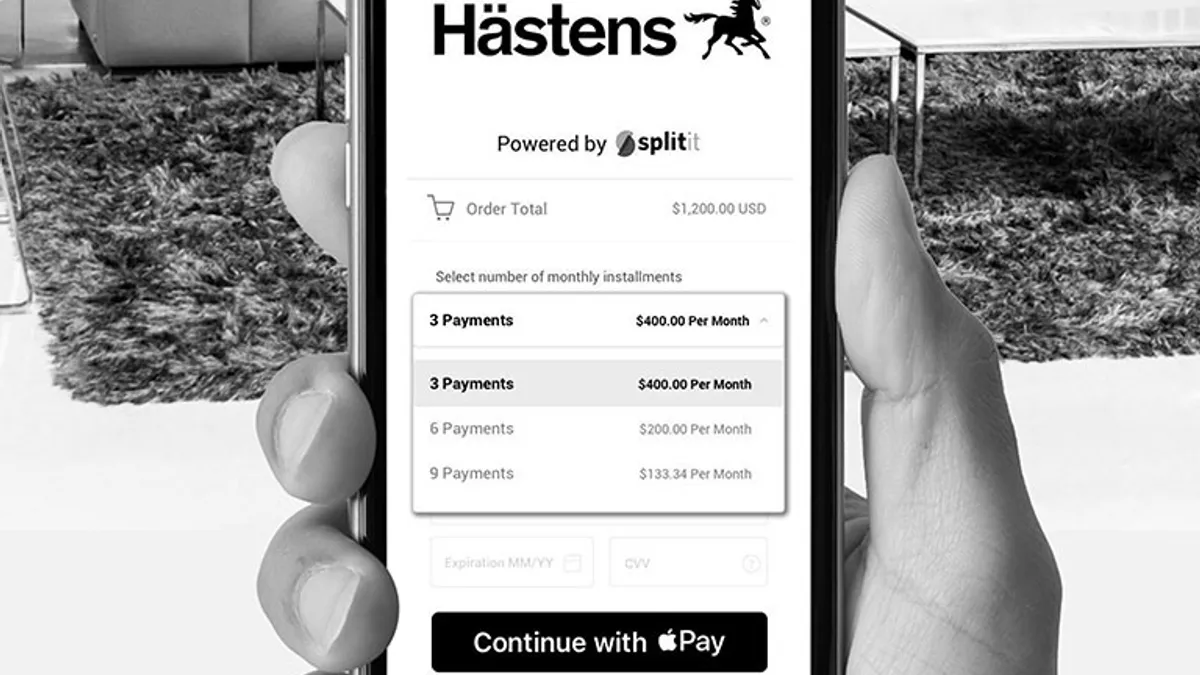Dive Brief:
- Amid possible consolidation in the buy now, pay later sector, New York-based installment payment provider Splitit is on a path to acquire technology assets.
- “We’re not looking to be acquired,” CEO Nandan Sheth said in an interview at the National Retail Federation conference in New York on Tuesday. “We are interested in [acquiring] potentially some technology that accelerates our ability to deliver (the company’s brand of white label) installments.”
- Sheth said the Consumer Financial Protection Bureau’s plans to introduce new rules for the BNPL sector will ensure consumers and merchants are protected. He noted, however, that these regulations wouldn’t apply to Splitit because it runs on credit card rails and falls under Regulation Z, also known as the Truth in Lending Act.
Dive Insight:
Splitit, founded in 2012, has raised more than $100 million in equity funding. The company differentiates itself from other BNPL providers in that it doesn’t originate new loans at the point of sale.
Splitit’s offering, which is embedded in merchant checkouts, allows businesses to offer interest-free monthly installment payments by checking whether the purchase amount falls within a customer’s existing credit limit. Splitit doesn’t carry out a formal credit check.
Sheth said Splitit’s model insulates it from pressures the broader BNPL sector might face in an economic downturn because it taps into consumers’ existing credit, and is curbed by those limits.
“If that existing credit starts to compress, we're going to decline [customers],” he said. “For the broader industry, I think there will be a seismic problem, because they're going to continue to underwrite and originate new loans in an environment where inflation is more of a problem.”
Splitit is open to technology acquisitions, but the company is not interested in acquiring a loan portfolio, he said.
Regulation of the BNPL sector
Credit bureaus, including Equifax, Experian and TransUnion, allow BNPL providers to report the payment plans on consumer credit reports, but most haven’t yet done so amid concerns they may lower credit scores – even when payments are paid on time and in full.
In September, CFPB Director Rohit Chopra said the agency is considering rules or “interpretative guidance” to ensure BNPL providers adhere to laws that apply to credit card companies. The CFPB also said it plans to institute supervisory examinations of BNPL players.
Regulation of the BNPL sector, Sheth said, should address underwriting, the credit pull itself and reporting, including whether repayments were made.
“The reporting should be complete, it should be not just whether you have a loan, but [whether you] couldn't pay this loan back,” he said.
For consumer payments financed by Splitit, the company takes on 100% of the risk, and Splitit’s write-off rates are about 7 basis points, according to the company.
The road ahead for Splitit
In a third-quarter update last October, Splitit, which works with 1,200 merchants worldwide, reported $95 million in merchant sales volume during the quarter, a 2% year-over-year increase. It will report fourth-quarter results on Jan. 31.
Splitit currently integrates directly with merchants; acquirers and payment processors; as well as shopping carts such as Shopify and BigCommerce.
The company’s growth plans include expanding its payment network partnerships; working with issuers, including banks; adding international marketplaces and merchants (including a tie-up with AliExpress announced this week); and diversifying the verticals in which Splitit’s toolset operates, Sheth said.
Electronics, luxury and general retail currently make up about 80% of Splitit’s business, with home and health care covering the remaining 20%, the company said. Among these verticals, the home category is growing 40% year over year.
Splitit, according to Sheth, doesn’t intend to compete with banks, payment processors and payment networks, but act as “the glue that brings this ecosystem together,” relying on consumers’ existing credit availability.










